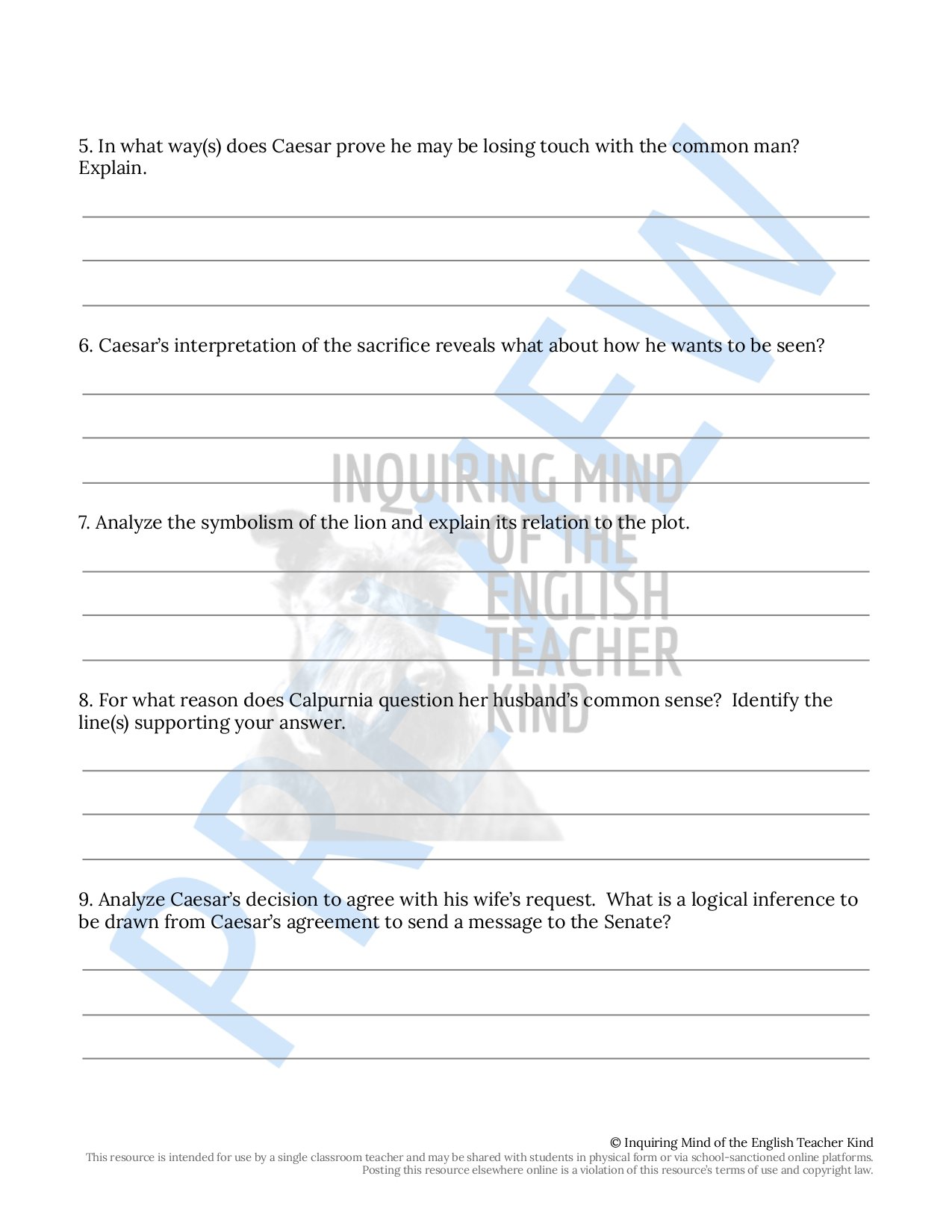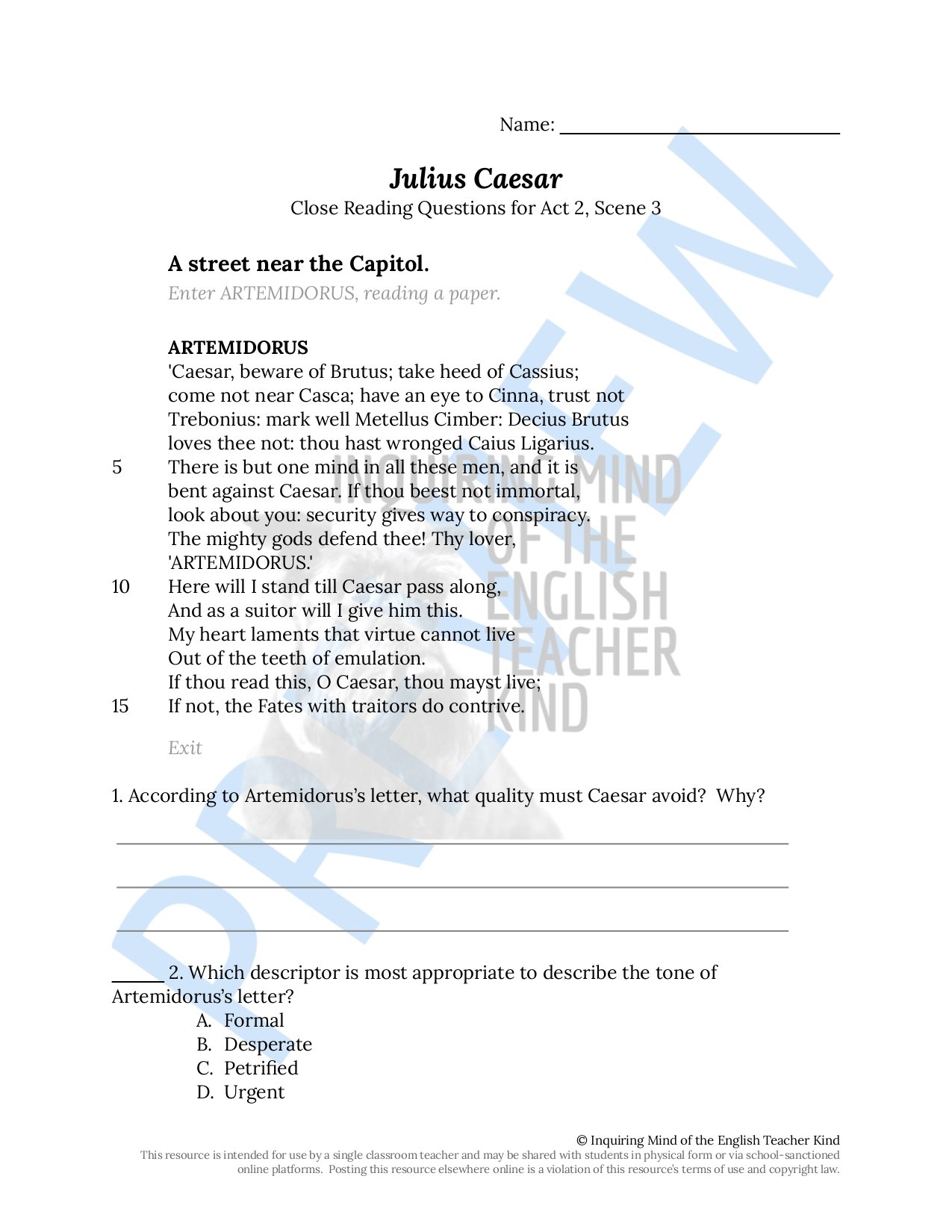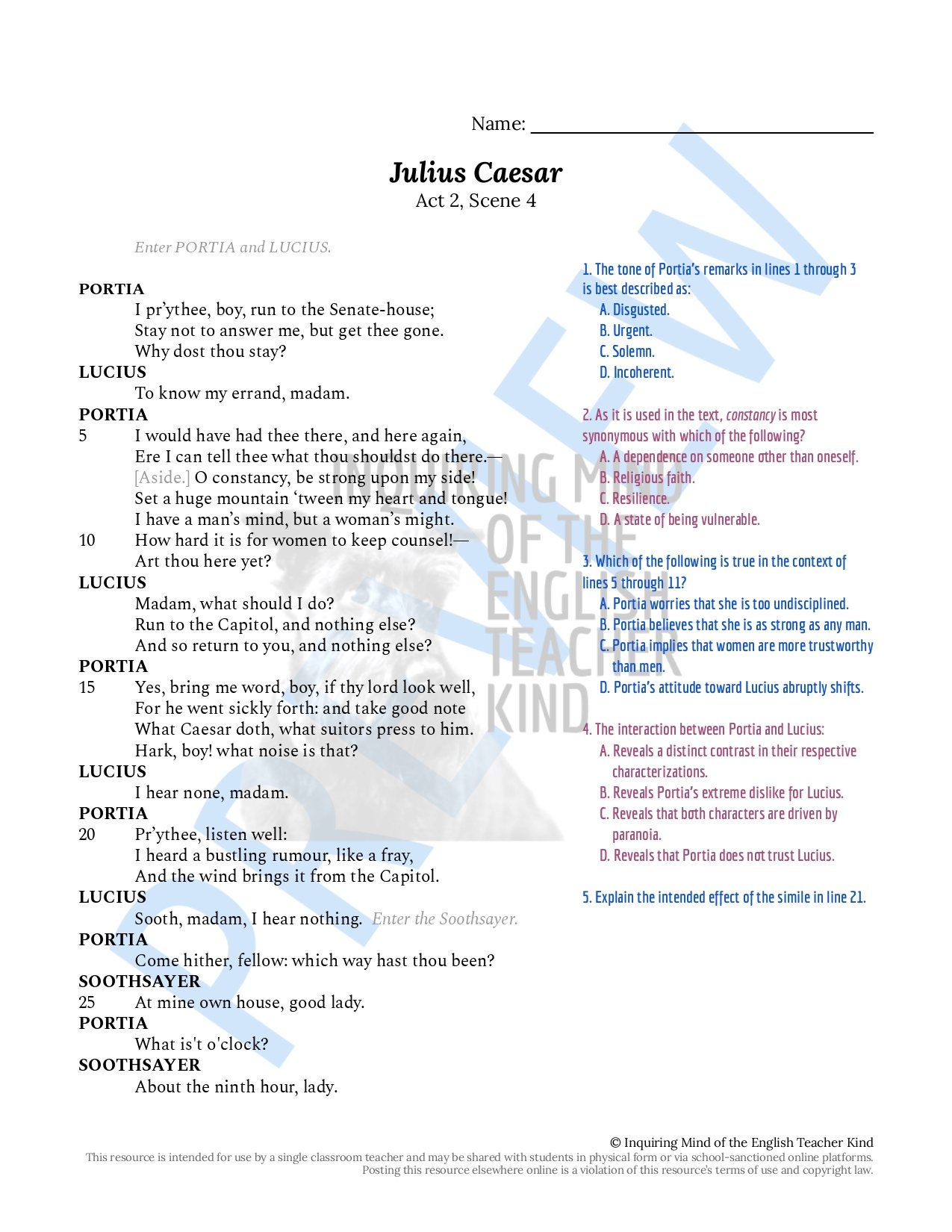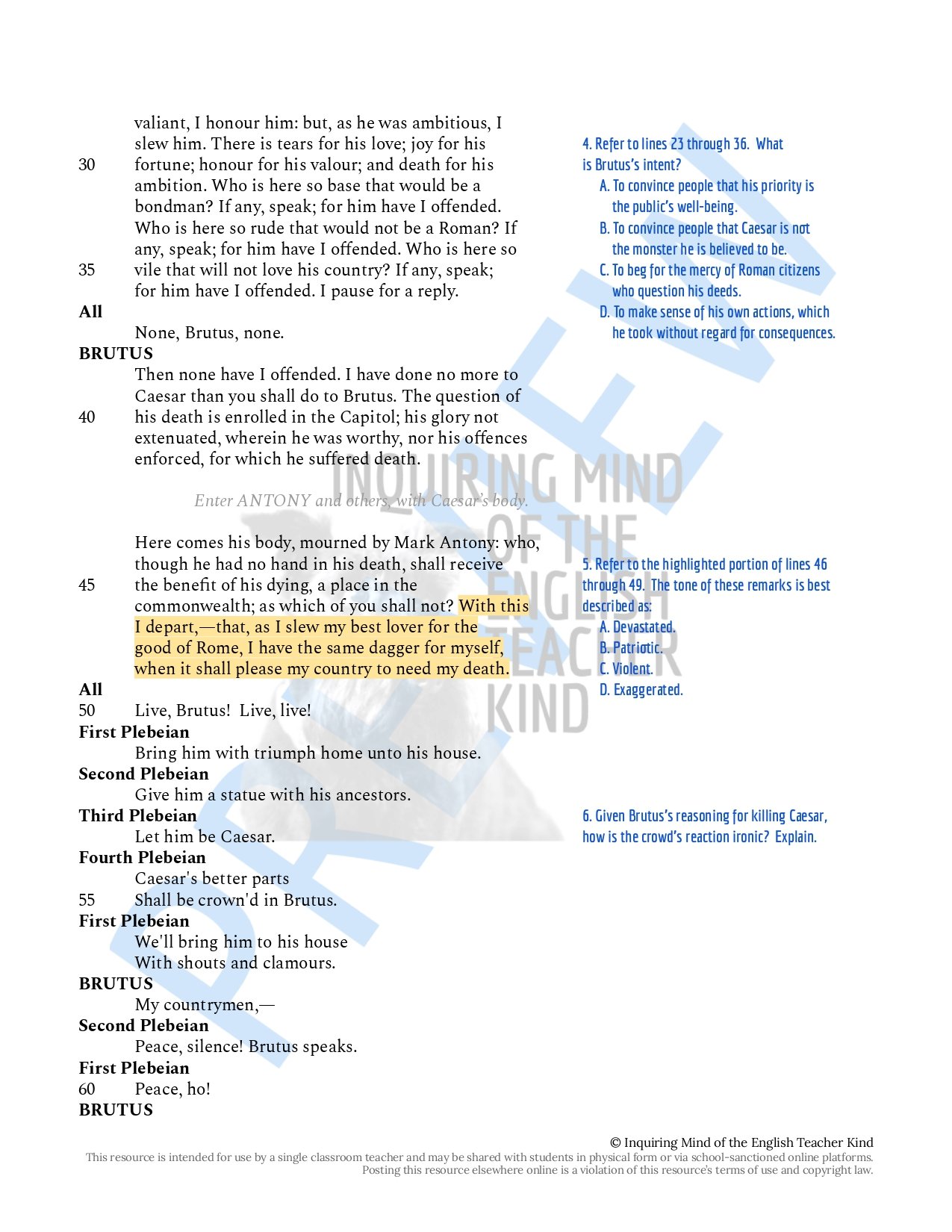 Image 1 of 10
Image 1 of 10

 Image 2 of 10
Image 2 of 10

 Image 3 of 10
Image 3 of 10

 Image 4 of 10
Image 4 of 10

 Image 5 of 10
Image 5 of 10

 Image 6 of 10
Image 6 of 10

 Image 7 of 10
Image 7 of 10

 Image 8 of 10
Image 8 of 10

 Image 9 of 10
Image 9 of 10

 Image 10 of 10
Image 10 of 10











Shakespeare's Julius Caesar Test and Answer Key for High School
Eliminate assessment planning responsibilities and evaluate high school students' knowledge of plot and literary craft with this 50-question summative test covering William Shakespeare's Julius Caesar. An answer key is included. Materials are delivered in editable Word Document and printable PDF formats. (Alternatively, a self-grading Google Drive option is available.) A breakdown of content follows.
Part 1. Knowledge of Plot. Students will demonstrate comprehension of the following:
The motivations of a crowd in Act 1
The Feast of Lupercal
The function of the Soothsayer
Cassius' manipulation of Brutus
How Brutus rationalizes murderous deeds
Brutus' faith in his followers
Calpurnia's nightmares
Supernatural occurrences preceding Caesar's death
The purpose of Artemidorus' letter
Caesar's hubris
Antony's apology to Caesar's corpse
Brutus' self-image
Efforts to manipulate Caesar's will
The changing nature of Brutus and Cassius' relationship
Cassius' dynamic character
The nature of Cassius' death
Antony's treatment of Lucilius
Brutus' suicide
Part 2. True/False. Students will identify whether a statement is true or false. Questions focus on:
Setting
Peculiar incidents preceding Caesar's death
Portia's concern for Caesar
Antony's dire prediction for the fate of the Republic
The public's rejection of Brutus
Qualities about Cassius that make Brutus suspicious
A poet
Titinius' criticism of Brutus' orders
Part 3. Quotations in Context. Students will match an excerpt with its appropriate context.
Act 1, scene 2: "When Caesar says ‘do this,’ it is perform’d."
Act 1, scene 2: "Yond Cassius has a lean and hungry look."
Act 2, scene 1: "O Rome, I make thee promise: / If the redress will follow, thou receivest / Thy full petition at the hand of Brutus!"
Act 2, scene 2: "When beggars die there are no comets seen; / The heavens themselves blaze forth the death of princes."
Act 3, scene 1: "And men are flesh and blood, and apprehensive; / Yet in the number I do know but one / That unassailable holds on his rank, / Unshaked of motion: and that I am he..."
Act 4, scene 3: "O, I could weep / My spirit from mine eyes!"
Act 5, scene 3: "This day I breathed first: time is come round, / And where I did begin, there shall I end; / My life is run his compass..."
Part 4. Application of Literary Devices. Students will be given a detail or excerpt from the drama and must determine which literary device is best reflected. Literary devices addressed include:
Personification
Anaphora
Hyperbaton
Alliteration
Metaphor
Simile
Onomatopoeia
Hyperbole
Materials are available for teaching a variety of Shakespeare's plays:
Eliminate assessment planning responsibilities and evaluate high school students' knowledge of plot and literary craft with this 50-question summative test covering William Shakespeare's Julius Caesar. An answer key is included. Materials are delivered in editable Word Document and printable PDF formats. (Alternatively, a self-grading Google Drive option is available.) A breakdown of content follows.
Part 1. Knowledge of Plot. Students will demonstrate comprehension of the following:
The motivations of a crowd in Act 1
The Feast of Lupercal
The function of the Soothsayer
Cassius' manipulation of Brutus
How Brutus rationalizes murderous deeds
Brutus' faith in his followers
Calpurnia's nightmares
Supernatural occurrences preceding Caesar's death
The purpose of Artemidorus' letter
Caesar's hubris
Antony's apology to Caesar's corpse
Brutus' self-image
Efforts to manipulate Caesar's will
The changing nature of Brutus and Cassius' relationship
Cassius' dynamic character
The nature of Cassius' death
Antony's treatment of Lucilius
Brutus' suicide
Part 2. True/False. Students will identify whether a statement is true or false. Questions focus on:
Setting
Peculiar incidents preceding Caesar's death
Portia's concern for Caesar
Antony's dire prediction for the fate of the Republic
The public's rejection of Brutus
Qualities about Cassius that make Brutus suspicious
A poet
Titinius' criticism of Brutus' orders
Part 3. Quotations in Context. Students will match an excerpt with its appropriate context.
Act 1, scene 2: "When Caesar says ‘do this,’ it is perform’d."
Act 1, scene 2: "Yond Cassius has a lean and hungry look."
Act 2, scene 1: "O Rome, I make thee promise: / If the redress will follow, thou receivest / Thy full petition at the hand of Brutus!"
Act 2, scene 2: "When beggars die there are no comets seen; / The heavens themselves blaze forth the death of princes."
Act 3, scene 1: "And men are flesh and blood, and apprehensive; / Yet in the number I do know but one / That unassailable holds on his rank, / Unshaked of motion: and that I am he..."
Act 4, scene 3: "O, I could weep / My spirit from mine eyes!"
Act 5, scene 3: "This day I breathed first: time is come round, / And where I did begin, there shall I end; / My life is run his compass..."
Part 4. Application of Literary Devices. Students will be given a detail or excerpt from the drama and must determine which literary device is best reflected. Literary devices addressed include:
Personification
Anaphora
Hyperbaton
Alliteration
Metaphor
Simile
Onomatopoeia
Hyperbole
Materials are available for teaching a variety of Shakespeare's plays:
Preview this resource:
Eliminate assessment planning responsibilities and evaluate high school students' knowledge of plot and literary craft with this 50-question summative test covering William Shakespeare's Julius Caesar. An answer key is included.











































































































































































